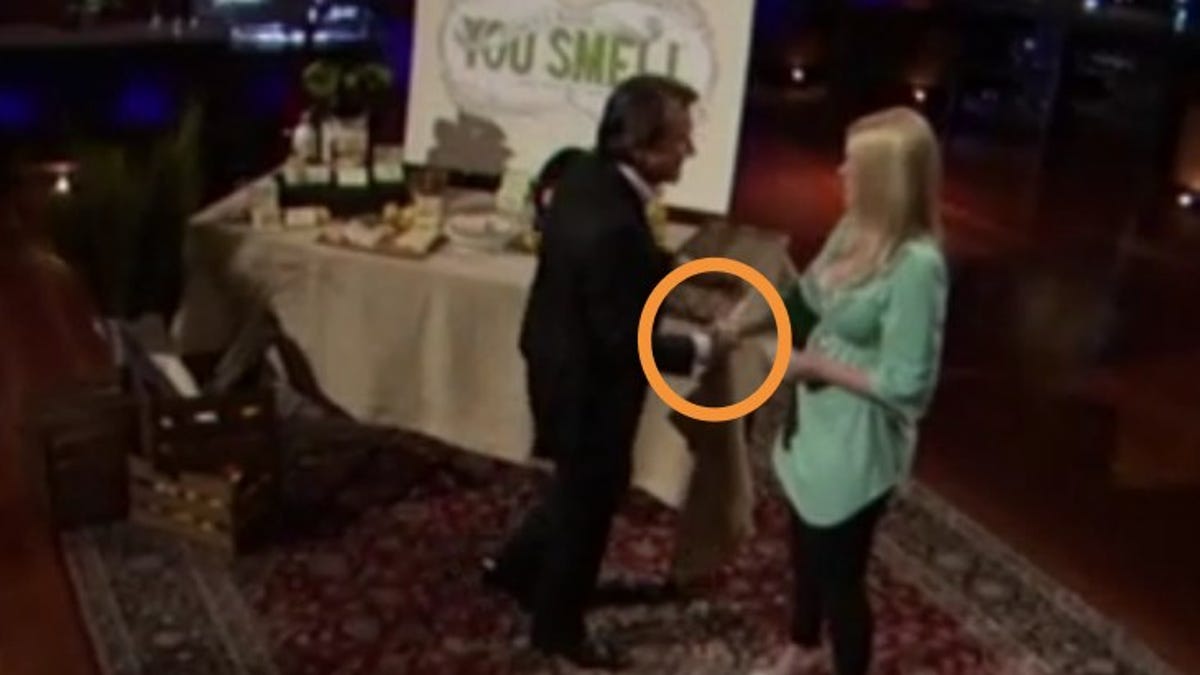Stiffed by 'Shark Tank' VC, startup CEO perseveres
How a startup entrepreneur won, then lost, then won again.

When is a handshake deal not a deal? When it's on national TV.
On the ABC show "Shark Tank" earlier this month, a young, first-time entrepreneur, Megan Cummins, successfully pitched the panel of five "sharks" to raise money for her company, You Smell Soap. It's safe to say that the sharks liked her moxie. Cummins turned down offers from Mark Cuban and Barbara Corcoran, and took the deal from Canadian software mogul Robert Herjavec: $55,000 for 20 percent of her company, with a $50,000 kicker as her "salary" for the first year. (Here's the full episode; Cummins appears at about the 32:00 mark.)
I asked Cummins last week how the business was going, and what she had done with Herjavec's money.
"We never got the money," she said.
It wasn't for lack of trying. While her "Shark Tank" episode just aired this month, this story starts back in July of 2011, when the show was taped. As is standard for reality show contests, Cummins was contractually forbidden to speak about the outcome of the show until it finally aired.
Cummins said that for six months after the show was taped in July, she tried to contact Herjavec to close the deal. All communications were routed through his assistants. Eventually, Cummins said, the word came back that Herjavec "didn't know we were a startup and had no sales."
That seemed like an odd objection, given the nature of the show she appeared on and the questions she was asked on the show about the precise stage of her business. Continued attempts to communicate directly with Herjavec failed, she said. Finally, in December, a contract arrived from his office with revised terms: Herjavec would buy half of the company for $55,000.
By this time, still two months before her "Shark Tank" episode aired, interest and orders for You Smell Soap were flowing in from small and medium resellers. It appeared to Cummins that she had a business, and she knew it was based purely on her tenacity.
Cummins turned down the new deal.
And then things got interesting
The "Shark Tank" episode with her on it aired in February and was seen by 5.9 million viewers. Things ramped up even more. National retailers became interested in carrying You Smell products, obviously hoping to take advantage of all the free publicity from the "Shark Tank" episode.
But You Smell couldn't, and still can't, deliver the goods fast enough. Without the seed funding to invest in materials and inventory, it's been difficult to get the business off the ground. With no assets to speak of, she's been unable to secure a bank loan or other funds, aside from a little friends and family money. Cummins and her (employed) fiance have been struggling for months to keep the company going.
Cummins points to her bare ring finger as we are talking, and tells me, "I really wanted a ring, but we took the money my fiance had saved for it and put it into the company."
Herjavec, when asked about the Cummins deal, said in an e-mail that, "After the show we begin the due diligence process. As is the case with Megan in the process you find out different things and adjust. Both sides have the opportunity for due diligence and to make a decision."
Indeed, as the "Shark Tank" contract with its entrepreneurs states, "It is customary for parties to a business transaction to conduct due diligence as to the suitability and viability of the transaction and, accordingly, it is possible that no definitive agreement may be reached."
This story of a semi-broken, not-quite promise (nobody really expects what they see on a reality show to be the unvarnished truth, do they?) will likely have a happy ending, and without even too many hurt feelings.
Cummins says, "I think it was for the best." She got what she really needed from the show: publicity and orders. It's been a tough road, but she's optimistic about the business. And now she doesn't have a Canadian security software exec owning a giant chunk of her business.
Herjavec, while appearing at least to me to have strung along a new, young entrepreneur, does convincingly express enthusiasm for the spirit of the show. He says, "What I love about our show is that it shows entrepreneurship is alive and well. People can succeed without a big fancy degree or by working on Wall Street."
Or even, it appears, without the money they're promised.
(Disclosure: ABC is a competitor to CBS, which owns CNET.)

